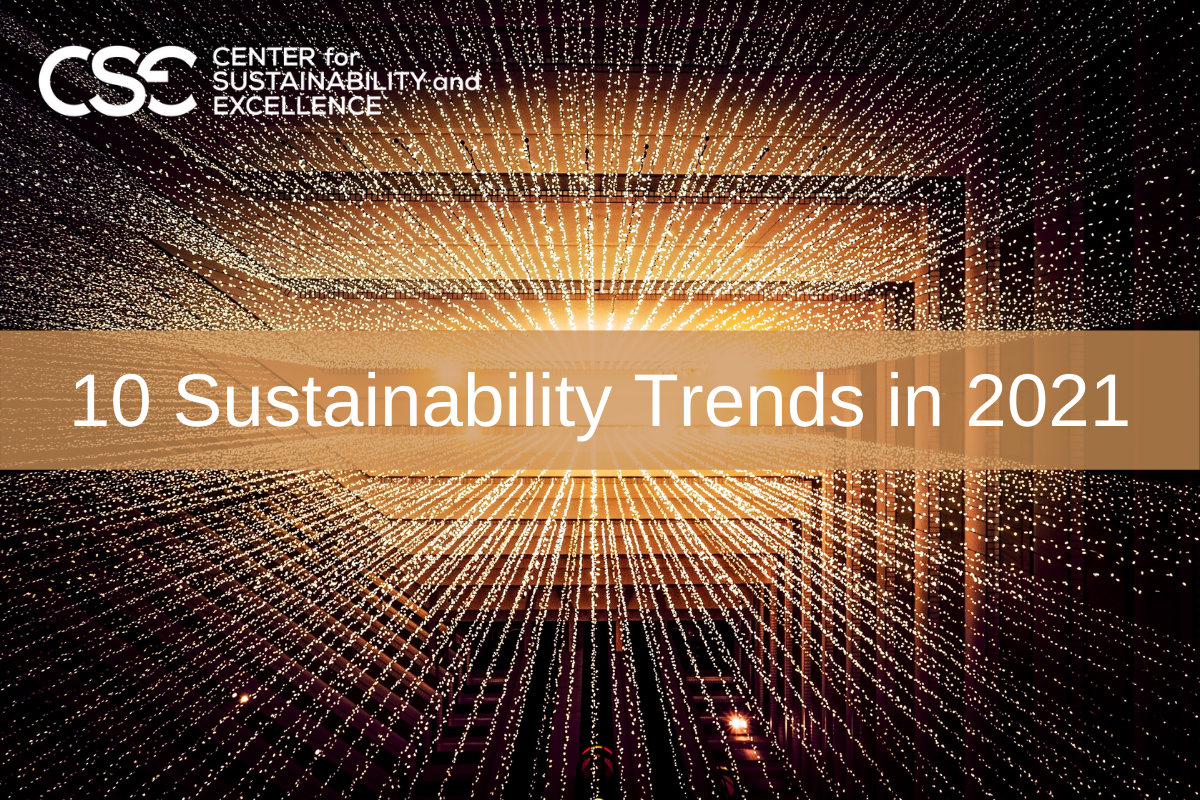By CSE Research Team
The COVID-19 pandemic came in 2020 to reinforce the climate crisis and increase business challenges and risks for investors and C-Suite Executives in several sectors.
Let’s take a look at important trends, based on CSE recent research, which cannot be ignored by organizations. Climate risks, ESG factors for investors, non-economic disclosures, social inequality, ’Circular Economy’ and ‘Carbon Net Zero’ strategies are some of the issues that will be on the top of C-Suite Executives to-do-list of in order to introduce more resilient and sustainable strategies to their organizations for 2021 and beyond.
Here are the Top 10 Trends in sustainable business in 2021:
- Comprehensive consideration of ESG factors and access to capital
In order to mitigate the financial losses of this year, special emphasis will be given on regulating both access to funding and corporate ESG behavior. The trend towards increasing ESG coverage will lead to more disclosures, check and data points. It should be noted that ESG issues are increasingly the focus of investors and regulators in North America.
- Use of ESG ratings and Standards is becoming the norm
Looking at CSE’s latest ESG research in over 600 companies in North America, ESG rating and SASB Standards are increasingly popular to provide information in a manner that is most relevant to their financial stakeholders and investors. Moreover, the TCFD recommendations are gaining traction, as 38% of the top 10 companies are identifying and reporting their climate-related financial risks and opportunities. The number is expected to rise through 2021.
- Climate change risks and transparency
Five years ago, investors committed to align with the Paris Agreement, leading companies into a series of radical changes. Those who still do not disclose environmental data will feel the consequences more than any other year. The organizations that use the Task Force on Climate-related Financial Disclosures (TCFD), for the disclosure of the climate-related financial risk, have doubled compared to 2019.
- Changing Policies in financial institutions
The pressure is now transferred to the Financial Sector, calling on them to adopt strategies to reduce the carbon footprint, with restrictions and the phase out of fossil fuel financing. According to the Institute for Economic Energy and Financial Analysis (IEEFA), 150 major global financial institutions have implemented policies to exit coal, with 65 Financial Institutions committing to stricter lending guidelines.
- Reorganization of the supply chain and production
Many companies have recently faced severe supply shortages due to the pandemic. The closure of production sites, the inability to transport goods and much more led not only to the review of suppliers, but also the production process itself. ESG criteria will be further integrated into the supply chain process.
- Circular economy integration
Perhaps the above could be a prelude to change, as the concept of the Circular Economy is going to be consolidated next year and remodeling the production is what many entrepreneurs should be concerned about. Companies need to move fast towards the new commitments to make all packaging recyclable or reusable by 2025. More than 400 companies have adopted the New Plastic Economy Global Commitment, while companies representing 20% of all plastic packaging produced worldwide have already committed to replacing their packages by 2025.
- Zero Waste
Efforts to eliminate the increased waste problem will continue. This will be achieved through the application of state-of-the-art technology and through an unprecedented level of collaboration and coordination between recyclers, designers, packers, manufacturers, companies and governments. According to the National Zero Waste Conference, there are plans to develop policy recommendations for 2021 based on the new goals of the Biden Administration, while the priority is on the market of recycled products.
- Sustainable materials
In light of the zero waste and the circular economy, the transition from plastic to paper has become an increasingly popular option. The use of aluminum cans is expected to increase just as significantly due to its distinctive features – its durability and the fact that it is light weight.
- Social equality as a source of sustainable business
The crisis of Covid-19 came to rekindle something that had been overlooked throughout the last years- the huge levels of inequality in global wealth. In 2021, it is predicted that investors will engage in approaches with innovative practices that will promote equality and could be a source of sustainable business advantage.
- Biodiversity crisis
The pandemic has reminded us that nature is important not only for human preservation, but also for maintaining the world economy. There will be a transformation in the way investors deal with the loss of biodiversity.







